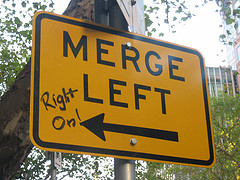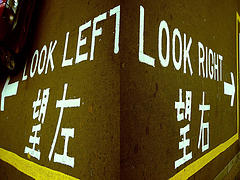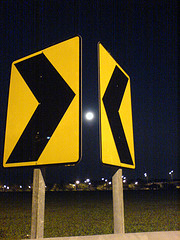Honton ko si kar dekhiye pachtaiye ga aap
Hangame jaag uthte hain aksar ghuttan ke baad
 Any anodyne effect this sher might have had on me was lost forever when my neo-Trotskyite friend decided to give me his interpretation of it. I didn’t ask for it, but there it was. A multi-headed hydra called “having coffee†– where the conversation starts off polite, turns to prittle-prattle , turns to poetry, turns to politics, turns to polemics, turns to punches. Lucky for me, he hits like a girl.
Any anodyne effect this sher might have had on me was lost forever when my neo-Trotskyite friend decided to give me his interpretation of it. I didn’t ask for it, but there it was. A multi-headed hydra called “having coffee†– where the conversation starts off polite, turns to prittle-prattle , turns to poetry, turns to politics, turns to polemics, turns to punches. Lucky for me, he hits like a girl.
“Religious extremism is the new communism,â€
he hissed, spraying spittle in all directions. I laughed. He carried on, unperturbed but passionate:
“The poor man has found his outlet – the injustice, the exploitation, the degradation, the desperation he’s suffered has found its expression. Islam, like communism, is based on egalitarian principles and promises them justice and equality. You think religious extremism has got anything to do with religion? It is nothing but the collective voice of a people who’ve been wronged their whole lives.â€
Somehow this gave me goose bumps and I quickly gulped down the latte in hope of thawing the chill his words left. It didn’t work and I got to thinking about Pakistan and Pakistanis everywhere.
Religious extremists in Pakistan can come from all walks of life but a sizeable chunk belongs to the poorer section of the society. Pakistani immigrants and expatriates living in the West also make up a significant portion. Why are these two groups more prone to religious extremism and terrorism? Was it that, time and again, they were discriminated against and shunted to silence? Did the exclusion leave such bitterness that it got bottled up inside for so long – so long that it is now, quite literally, exploding?
 In Pakistan’s context, the implication that religious extremism is connected to poverty and disfranchisement has been made not with a bang but a whimper (pun unintended). I think this concept needs to be forced to the fore. Many in the corridors of power are finding it convenient to ignore the ‘real’ reasons leading to Islamic radicalism, as that may point the j’accuse finger in their direction. But let’s briefly look at why a 19 year old Pakistani boy picks up a Kalashnikov or why a 37 year old father of three straps explosives around his waist.
In Pakistan’s context, the implication that religious extremism is connected to poverty and disfranchisement has been made not with a bang but a whimper (pun unintended). I think this concept needs to be forced to the fore. Many in the corridors of power are finding it convenient to ignore the ‘real’ reasons leading to Islamic radicalism, as that may point the j’accuse finger in their direction. But let’s briefly look at why a 19 year old Pakistani boy picks up a Kalashnikov or why a 37 year old father of three straps explosives around his waist.
It’s no secret that democratic institutions in Pakistan are in a frail state, if at all alive.
And then there is no Left or not much left of it. (The Communist Party of India could arguably be a good example of the importance of such a “balance of power†– on the domestic front at least.) In Pakistan very few avenues are open to the poor in need of some succour or just in need of voicing their distress. So, what happens? Under a dictatorship, and with no diversity of political parties to choose from, the poor, frustrated man turns to the radical Right – the Mullahs and their might.
Pakistani religious extremists living in the West dance to a slightly different tune. Feeling discriminated, displaced, alienated or plain confused – they crave to cling to a core, something that will anchor their sense of identity. Often times this comes in the form of religion. Sometimes its taken to an extreme. So, the religious radical turns to radicalism not out of a love for religion, but a deep hatred for those elements that he felt were unjust towards him (or his brethren.) Anti-Western sentiments do not transpire from Koranic verses, instead they’re born of the experiences one had in/of the West and the bitter taste that can leave in one’s mouth… body and soul.
 This is important. Scholars like Nichole Argo have accentuated the point: emotional and social ties precede the acquisition of ideology. Either our social situation has to be in the doldrums or our emotional condition so wounded that we take a religious ideology to an extreme. The media almost always portrays the religious extremist or terrorist as a gun-slinging gung-ho Islamist with a medieval mind and beard to boot. He is a dangerous, diehard jihadi on a mission to kill or be martyred trying. Such a description is like a donut-truth; the truth, the whole truth, with a hole in the truth (I forget what film this line is from). That hole is the real reasons people are pushed to accept a radicalised Islam, and these reason need to be better understood if we sincerely hope to curb extremism. Half-measures – like madrassa reformation – being implemented by our marginal-satisfiers might prove productive in that they’re broadening the narrow teachings of many religious seminaries. But they’re not preventing extremism. People, especially the poor and alienated, will continue to feel helpless in the face of a system they despise but can’t do anything to change. In fact, they may feel, and most do, that the measures being taken to tackle extremism are the spawn of the West, the very demon they wish to slay. So, they will continue feeling dejected and cheated. This inadvertently leads to the shift in their psyche that paves way for an extremist view.
This is important. Scholars like Nichole Argo have accentuated the point: emotional and social ties precede the acquisition of ideology. Either our social situation has to be in the doldrums or our emotional condition so wounded that we take a religious ideology to an extreme. The media almost always portrays the religious extremist or terrorist as a gun-slinging gung-ho Islamist with a medieval mind and beard to boot. He is a dangerous, diehard jihadi on a mission to kill or be martyred trying. Such a description is like a donut-truth; the truth, the whole truth, with a hole in the truth (I forget what film this line is from). That hole is the real reasons people are pushed to accept a radicalised Islam, and these reason need to be better understood if we sincerely hope to curb extremism. Half-measures – like madrassa reformation – being implemented by our marginal-satisfiers might prove productive in that they’re broadening the narrow teachings of many religious seminaries. But they’re not preventing extremism. People, especially the poor and alienated, will continue to feel helpless in the face of a system they despise but can’t do anything to change. In fact, they may feel, and most do, that the measures being taken to tackle extremism are the spawn of the West, the very demon they wish to slay. So, they will continue feeling dejected and cheated. This inadvertently leads to the shift in their psyche that paves way for an extremist view.
Some extremists may genuinely be harbouring a twisted interpretation of religion, and others may just be twisted by nature. But I believe that for most the acquisition of a radical religious ideology is triggered from a more fundamental feeling of victimisation, of feeling wronged, and/or being part of a harshly unjust system. In such cases religion offers unction, and a bandwagon-effect ensues whereby millions of disempowered and discriminated find a mouthpiece and meaning in the Right. Ironically, the factors thrusting them to the extreme right is born of leftist logic; an anti-establishment egalitarian cry for equal rights for the common citizen.
(How corrupt leaders exploit this feeling in the masses to further their own political interests is another matter. Also I would like to advise everyone to not turn this into a debate about Islam. It is about how the basic wrongs in society which cause an individual to adopt an extremist view, and how it is these wrongs that need to be focused if we wish to break free from the vicious cycle of militancy and dictatorship.)
Photo Credits: Flickr.com



















































Let us agree to disagree
I respect it and agreed. :-)
On a side note, recently I met iFaqeer bhai when he was in karachi. It was a nice experience to meet any blogger in real life. Though we didn’t have much time to discuss despite of he was eager to talk more and more and me too. Once ifaqeer bhai started a thread on facebook which I had rejected at first place. The point he raised was good to hear but practically not implmentable. Atleast after reading your comments Raza. I think yo were also part of that thread if I am not wrong in which Sabahat bhai was talking about reducing gap between different cabals in Pakistan and I had rejected by giving reason that unless sabahat bhai can’t be able to convince people like you who might be more closer to him due to ideology, he can’t convince others who might think differently.
if Sabahat bhai is reading all this, I would like to ask how his *dream* could come true when one is totally sidelines by declaring “extremist”? is this not being done by Mush who have started a war against tribesman and not willing to handle thing politically? I don’t understand why then a group of liberals hate Musharraf when they don’t act different than him. This is something which is complex. more than “String Theory”.
Abid, I’m afraid I didn’t take anything you said as criticism. Maybe because your “misplaced liberalism” allegation strikes me as being rather misplaced in itself. I was just trying to be seriocomical in that quote of mine you enjoy repeating, there really is nothing there to split hairs about.
I agree that there is a lot of misplaced liberalism around us, but I’m sure you can find better examples/quotes that could assuage your need to address the particular issue.
Raza, Sageman was looking at international terrorists, and there is a consensus of opinion that in order for a terrorist to operate on a global scale, he needs to be educated and sophisticated (enough so to “blend in the West”). Omar Sheikh and other Pakistani “extremists” living in the West are therefore able recruits for international level terrorist acts. I don’t think anyone has really studied religious extremism within Pakistans context – at least not by taking into account social variables. Christine Fair has done some research and I think recently Saleem Ali looked at the role of madrassas and “extremism.”
I posited two groups of Pakistanis, the ones belonging to the poorer segments of Pakistani society, and the Diaspora living in the West, as likable candidates for adopting a radicalised religious view – inducing them to violence. Omar Shiekh and the perpetrators of the 7/7 bombings could be included in the latter category. What interests me more is ‘why’ they harbour this proclivity to “extremism.” For the Diaspora group, I think it might be that they’ve felt discriminated against in the West, that they feel their identity (inextricably linked with Islam) threatened by western influence, and the plight of Muslims around the world (Palestine, Kashmir, Chechnya, etc) inflames them to partake in violent “jihad”. Its just a hypothesis, I’d like to know what others think.
As for the “extremists” within Pakistan, as said I’m not sure there exist conclusive studies that can be referenced here, but from what Christine Fair and Saleem Ali have found there seems to be a link between “extremism” and poverty – if we take majority of madrassa goers to indeed be poor. Fair suggested that it depends on the operation at hand: domestic terror within Pakistan does not require one to be sophisticated or well rehearsed in linguistic skills – the poor make for eligible recruits. Again, I’m more interested in ‘why’ the poor? What propels him to maim and mayhem in the name of religion. I suggested it could be disempowerment, injustice, frustration etc.
A slight digression, but maybe relevant for the discussion on the importance of contextualising “extremism”: I can’t remember who said it, I think it was Sami ul Haq – when asked a question about “terrorists”, he replied along the lines of, “I don’t understand what you mean by ‘terrorist’; those holding guns are being called terrorists and those dropping bombs are not terrorists?”
so all of your anger is against “Deobandis” rather actual root cause?
Let me clear another confusion of yours. I am a barelvi by family. Both my Dadihaal and nanihaal are barelvis and none of us any association with deobandi sect but I am not stopped to participate in tableeghi gatherings. True it was started by a deobandi scholar but like you didn’t know about the litreature they discuss in their gatherings, you also have not clear idea that tableeghi movement has no relation with any particular sect. I myself know what kind of things are taught in barelviat and I myself have attended and listend various speeches of tableeghis, No where I felt that someone was hitting my ancestor’s mazhab. You should rather listen their stuff first before reaching to some conclusion.
let me tell you that they do not IMPOSE their views on others, do not want political power, create a parallel state
and I would like to learn how deobandis whom you called Tableeghis impose their views? did any deobandi put pistor on your head and force you to attend their gathering? or by imposition you mean figures like JJ and Yusuf who now wears topi and shalwar kameez all the time? if wearing of certain clothes is imposition then this is done by other sects which I mentioned above. All I know I was never forced to attend their ijtema despite of my inclinaton. In short they didn’t impose anything on me as yet.
heir views on others, do not want political power, create a parallel state, court
another confusion. Tableeghis never go for politics or state power. They rather prefer to fix masses rather rulers. This is why there is big tussle between Jamat and Tableeghis. Jamatis want to impose things with help of politics while tableeghis prefer to work on individual’s character. A BIG difference. Thus this refute your attempt to associate tableeghis with guys fighting against army on border. Most of your comments are based on gossips rather concrete arguments.
We were talking about the extremists
No, yo are just targeting a sect here rather extremism. some personal issue I must say. Even if I follow your definition, your definition fo extremism apply more on other sects than deobandis OR tableeghis.
Shops, homes and personal spaces are different from cricket grounds, stadiums and
Adnan: I think that we can continue this debate via email as it is turning into a dialogue here – Let us agree to disagree :)
Adnan:
Tablighi jamaat is apolitical and ascetic – we know that but it has string links with and emanates from the Deobandi school. Al-Huda preaches Saudi version of Islam and that is just another particular version.
I am trying not to digress but I don’t know enough about Ismailis and Bohris – let me tell you that they do not IMPOSE their views on others, do not want political power, create a parallel state, courts (as in Malakand and Swat), do not prevent their women from seeing male doctors even if it means that they will die and do not close girls’ schools.
And above all they do not tie bombs around themselves and kill civilians – that Mr Laden and his followers glorify, preach and practise.
We were talking about the extremists – a wide variety in Pakistan among them are of a particular group and they are not content with moral policing – they evidently want to take over the state and impose the version of Shariah that was implemented in Afghanistan!
Lastly, because of the absence of any unified definition of what is “Islamic” (varies across Saudi Arabia, Turkey, Iran, Indonesia, Pakistan, Syria and the UAE) the state business should not have anything with religion and this was also held by the Quaid – and that is my point. Religion is a personal matter and it should remain a private issue between man and God .
Shops, homes and personal spaces are different from cricket grounds, stadiums and ‘public’ places. Therefore, religiosity in public domain connotes a different
Why do we have to compare ourselves to Ekta Kapoor, Kareena or whoever you mentioned in your earlier comments. I have nothing to add on Shoaib Mansoor and Nadeem Paracha – hope you are not considering me a spokesperson for all ‘liberals’ – another brand that comes from the West by the way.
Excessive emphasis on rituals and symbols tends to sideline the essential message of social justice, equality, egalitarianism that made Islam so appealing in South Asia and other parts of the world. Therefore, rituals and inner cleansing alone is not sufficient in the land of the pure.
I am sure that I haven’t answered all your questions but I have to be brief here.